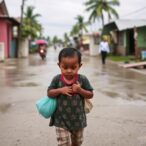
In the midst of the ongoing challenges posed by the COVID-19 pandemic, a new study sheds light on the intersection of cancer treatment and viral infection outcomes, focusing specifically on the use of immunotherapy. Researchers have delved into the critical question of whether immunotherapy, a revolutionary cancer treatment, exacerbates early mortality risks in patients who contract COVID-19. Their findings not only challenge prevailing anxieties but also enhance the strategic framework for clinical decision-making during pandemics.
Immunotherapy has transformed oncology by leveraging the body’s immune system to combat cancer cells. However, its interaction with COVID-19 infection remains a matter of concern due to the potential for overlapping immune responses and complications. The interplay between the immune activation induced by immunotherapy and the immune dysregulation caused by SARS-CoV-2 infection raises complex clinical questions. The current investigation arose from a necessity to clarify these uncertainties and provide evidence-based guidance for oncologists treating vulnerable patient populations.
The research team conducted a retrospective cohort study utilizing extensive linked health administrative data sourced from Ontario, Canada. The focus was on patients diagnosed with solid tumors who received immunotherapy within 120 days prior to a confirmed COVID-19 diagnosis. This temporal window was carefully selected to capture the immediate immunological milieu influenced by cancer treatment at the time of viral infection. By analyzing mortality within 30 days following the positive COVID-19 test, the study sought to quantify the short-term fatality risk associated with this unique patient subset.
Delving into the dataset spanning from January 2020 to April 2023, the study encompassed 281 patients, providing a substantial sample size for a niche clinical scenario. The demographic profile revealed a mean patient age of 68 years, with a near-equal gender distribution noted—45% female—and a significant majority adorned with lung cancer diagnoses accounting for 58%. These baseline characteristics reflect the vulnerability and diversity within the cancer population affected by the pandemic.
Treatment specifics indicated that 59% of the patients had received single-agent immunotherapy. This detail highlights a predominant preference or clinical indication for monotherapy among this cohort, which could influence immune system dynamics differently compared to combination regimens. Concurrently, the vaccination status was encouraging; nearly 80% had received at least one dose of a COVID-19 vaccine, a factor with potential implications on immune response modulation and survival outcomes.
The mortality data extracted from the study illuminates a 30-day mortality rate of 22%, underscoring the substantial risk faced by cancer patients who contract COVID-19. Notably, less than 5% required intensive care admission or mechanical ventilation, suggesting that the high mortality rate may be driven by factors beyond acute respiratory failure or ICU-level complications. These observations compel a deeper exploration into the contributors of mortality in this specific patient group.
A sophisticated multivariable logistic regression analysis identified key clinical predictors of increased mortality. Older age emerged as a significant factor, with an odds ratio of 1.60, affirming the well-known heightened vulnerability of elderly patients. Past radiation therapy also correlated with worse outcomes (OR 2.38), hinting at the cumulative burden of cancer treatments on patient resilience during concurrent infectious insults.
Hematologic parameters provided crucial prognostic clues. Patients exhibiting hemoglobin levels below 10 g/dL faced a fourfold increased risk of death, indicating that anemia, potentially reflective of cancer cachexia, treatment effects, or chronic disease, severely compromises survival. Similarly, elevated leukocyte counts exceeding 11,000/mm³ were strongly associated with mortality (OR 3.63), potentially signaling uncontrolled inflammation or secondary infection susceptibility.
One of the most striking conclusions of this study is the apparent lack of direct association between recent immunotherapy and increased early mortality from COVID-19. Contrary to initial fears that immune checkpoint inhibitors or other immunomodulatory agents might amplify deleterious inflammatory cascades, the data suggests that immunotherapy, per se, does not exacerbate short-term fatality risk. This insight provides a measure of reassurance and underscores the importance of individualized patient assessments rather than blanket treatment modifications.
Clinically, these findings advocate for a nuanced approach when considering immunotherapy during viral pandemics. The identification of age, prior radiation, anemia, and leukocytosis as adverse prognostic markers demands careful patient evaluation and potential preemptive interventions. Oncologists might, for instance, prioritize supportive care measures or adjust treatment schedules in older, anemic patients with histories of extensive radiation therapy, while maintaining therapeutic intent in those without such risk factors.
The study also prompts reflection on the role of COVID-19 vaccination in this vulnerable cohort. Although not directly analyzed as a mortality determinant, the high vaccination uptake among participants hints at the possible mitigative impact of vaccines in blunting severe disease manifestations. Future research should aim to dissect the interplay between immunotherapy, vaccination status, and COVID-19 outcomes more explicitly.
From a public health perspective, the research underscores the importance of maintaining cancer care continuity even amidst pandemics, highlighting that treatment discontinuation or delay based solely on infection risk fears may not always be justified. Instead, stratified risk assessment predicated on patient-specific clinical profiles can optimize outcomes, balancing oncological control against infectious risk.
Finally, this investigation serves as a seminal contribution to the rapidly evolving evidence base linking cancer therapeutics with infectious disease outcomes. Its rigorous methodology, grounded in real-world data, bridges crucial knowledge gaps and empowers clinicians with actionable insights. As the medical community prepares for potential future pandemics or viral outbreaks, these findings could guide resilient, evidence-based oncology practices.
In summation, the intricate dance between cancer immunotherapy and COVID-19-related mortality is far from a straightforward narrative of heightened risk. Instead, the story is one of complex interdependencies wherein patient biological status, prior treatments, and hematological health overshadow the direct impact of immunotherapy. This revelation paves the way for safer cancer treatment strategies in a world where infectious challenges persist alongside chronic illnesses.
—
Subject of Research: Early mortality risk and clinical factors in cancer patients treated with immunotherapy who contract COVID-19 infection
Article Title: Early mortality in patients with cancer and COVID-19 infection treated with immunotherapy
Article References: Raphael, J., Le, B., Singh, S. et al. Early mortality in patients with cancer and COVID-19 infection treated with immunotherapy. BMC Cancer 25, 922 (2025). https://doi.org/10.1186/s12885-025-14318-2
Image Credits: Scienmag.com
DOI: https://doi.org/10.1186/s12885-025-14318-2
Tags: cancer treatment during pandemicsclinical decision-making in cancer carecomplications of immunotherapyCOVID-19 impact on cancer patientsearly death risk cancer patientshealth administrative data in researchimmune dysregulation in cancer patientsimmune response in cancer therapyimmunotherapy and COVID-19 outcomesoncologist guidance during COVID-19retrospective cohort study in oncologysolid tumors and viral infections


